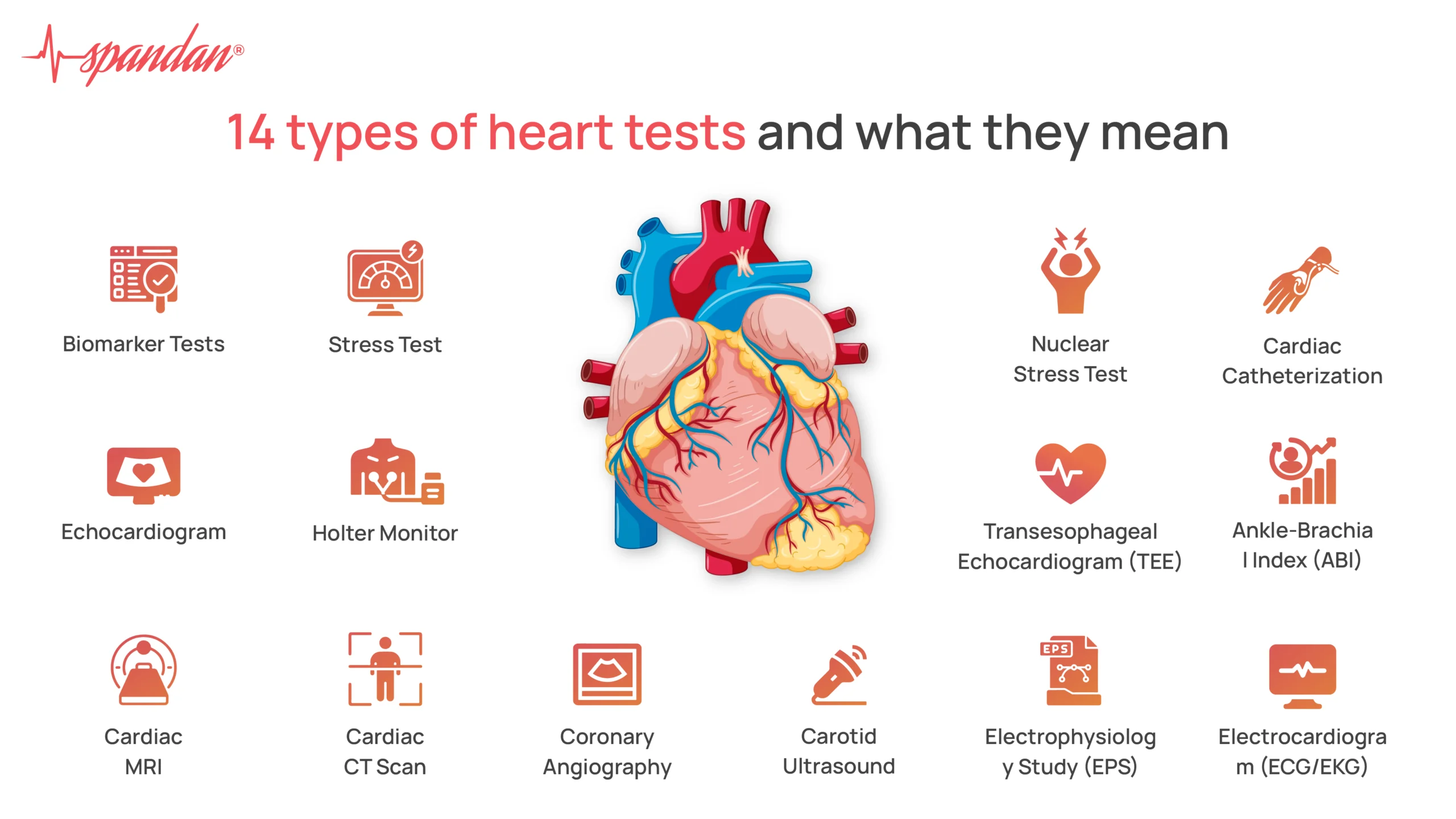
Author:- Mr. Ritesh Sharma
There are many different types of heart tests that are performed on patients to detect several heart abnormalities. Some of these tests are non-invasive and involve checking different facets of the heart, such as its electrical activity, heart rate, etc. On the other hand, other tests are invasive and give a vivid picture of the heart to detect the abnormalities closely. All of these types of heart tests are important in some way or the other. They provide instant screening of the heart or an elaborate screening to detect heart abnormalities closely.
In this blog, we have curated 14 types of heart tests that are done by healthcare professionals when you encounter any symptoms of heart problems, such as chest pain, heart palpitations, shortness of breath, etc. So, learn about these tests and find some education in the field of cardiology.
14 Types of Heart Tests
The 14 types of heart tests that we will discuss in this blog are- Electrocardiogram (ECG/EKG), Stress Test, Echocardiogram, Holter Monitor, Cardiac MRI, Cardiac CT Scan, Coronary Angiography, Transesophageal Echocardiogram (TEE), Nuclear Stress Test, Cardiac Catheterization, Carotid Ultrasound, Ankle-Brachial Index (ABI), Electrophysiology Study (EPS) and Biomarker Tests. The descriptive analysis of all these tests is as follows.
Electrocardiogram (ECG/EKG):
An ECG records the electrical activity of the heart. It detects abnormal rhythms, such as cardiac arrhythmias, and evaluates heart rate and rhythm. It’s a non-invasive procedure often performed during routine check-ups or when symptoms like chest pain or palpitations are present. An abnormal ECG determines numerous heart abnormalities.
Stress Test
Also known as an exercise stress test or treadmill test, this assesses how well your heart performs under physical stress. It helps diagnose coronary artery disease and determines safe levels of exercise post-heart surgery. During the test, your heart rate, blood pressure, and ECG are monitored while you walk on a treadmill or pedal a stationary bike.
Echocardiogram
An echocardiogram uses sound waves to create images of the heart’s structure and function. It evaluates the heart’s chambers, valves, and blood flow patterns. This test helps diagnose heart conditions like valve abnormalities, congenital heart defects, and heart failure.
Holter Monitor
A Holter monitor is a portable device worn for 24 to 48 hours to continuously record the heart’s electrical activity. It’s useful for detecting intermittent arrhythmias that may not show up during a standard ECG. Patients keep a diary of symptoms and activities during monitoring, aiding in correlation with recorded data.
Cardiac MRI
Cardiac magnetic resonance imaging (MRI) produces detailed images of the heart’s structure and function using magnetic fields and radio waves. It provides valuable information about heart muscle damage, scar tissue, and blood flow. Cardiac MRI helps diagnose conditions like heart attacks, cardiomyopathy, and congenital heart defects.
Cardiac CT Scan
A cardiac computed tomography (CT) scan uses X-rays to create detailed cross-sectional images of the heart and blood vessels. It’s commonly used to assess coronary artery disease by detecting calcium deposits or blockages in the arteries. CT angiography can also evaluate heart structure and function.
Coronary Angiography
This invasive procedure involves injecting a contrast dye into the coronary arteries to visualize blockages or narrowing. It’s considered the gold standard for diagnosing coronary artery disease. Coronary angiography helps cardiologists plan treatments like angioplasty or bypass surgery.
Transesophageal Echocardiogram (TEE)
A TEE is a specialized echocardiogram where a probe is passed into the esophagus to obtain clearer images of the heart’s structures. It’s particularly useful for assessing heart valves, blood clots, and infections within the heart. TEE is often performed during certain surgeries or when standard echocardiograms provide inadequate views.
Nuclear Stress Test
This combines a stress test with the injection of a radioactive dye that shows blood flow to the heart muscle. It’s highly sensitive for detecting areas of reduced blood flow, indicating coronary artery disease or previous heart attacks. Nuclear stress testing helps guide treatment decisions and assesses the effectiveness of interventions.
Cardiac Catheterization
During cardiac catheterization, a thin tube (catheter) is inserted into a blood vessel and threaded to the heart. It measures pressures within the heart chambers and obtains samples of blood to assess oxygen levels. It’s also used to perform procedures like angioplasty and stenting to open blocked arteries.
Carotid Ultrasound
This test uses ultrasound to visualize the carotid arteries in the neck, which supply blood to the brain. It detects plaque buildup or narrowing (stenosis) in these arteries, which can increase the risk of stroke or transient ischemic attack (TIA). Carotid ultrasound helps identify individuals who may benefit from interventions to prevent stroke.
Ankle-Brachial Index (ABI)
ABI compares blood pressure measurements in the ankles and arms to assess peripheral artery disease (PAD). Lower ABI values indicate reduced blood flow to the legs, which can cause symptoms like leg pain or cramping during exercise. ABI helps diagnose PAD and assesses the severity of arterial blockages.
Electrophysiology Study (EPS)
EPS is an invasive procedure used to diagnose and treat abnormal heart rhythms (arrhythmias). It involves threading catheters into the heart to map electrical signals and induce arrhythmias for evaluation. EPS helps identify the location and mechanism of arrhythmias, guiding decisions regarding medication or catheter ablation.
Biomarker Tests
Biomarkers like troponin and B-type natriuretic peptide (BNP) are substances released into the bloodstream in response to heart damage or stress. High levels of these biomarkers indicate conditions such as heart attacks or heart failure. Biomarker tests assist in diagnosing acute cardiac events and monitoring response to treatment.
In conclusion, these are the types of heart tests that are performed by healthcare professionals to detect a variety of heart abnormalities in individuals. While some of these tests such as an ECG are performed on the spot to detect heart abnormalities promptly and take immediate action, other tests like an echocardiogram are performed in very specific conditions. If you encounter any heart-related symptoms, you must consult a healthcare professional before opting for any of these tests.



